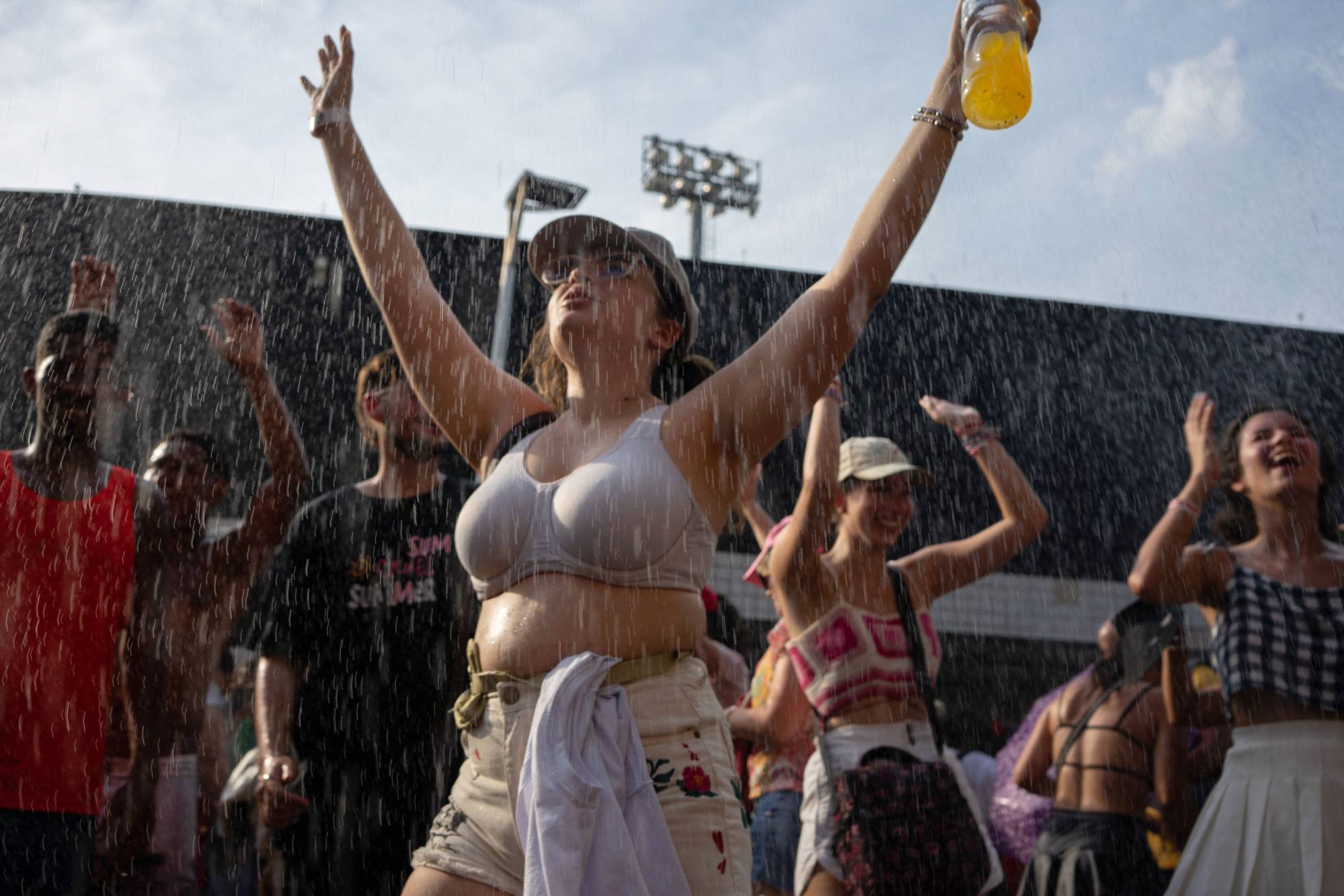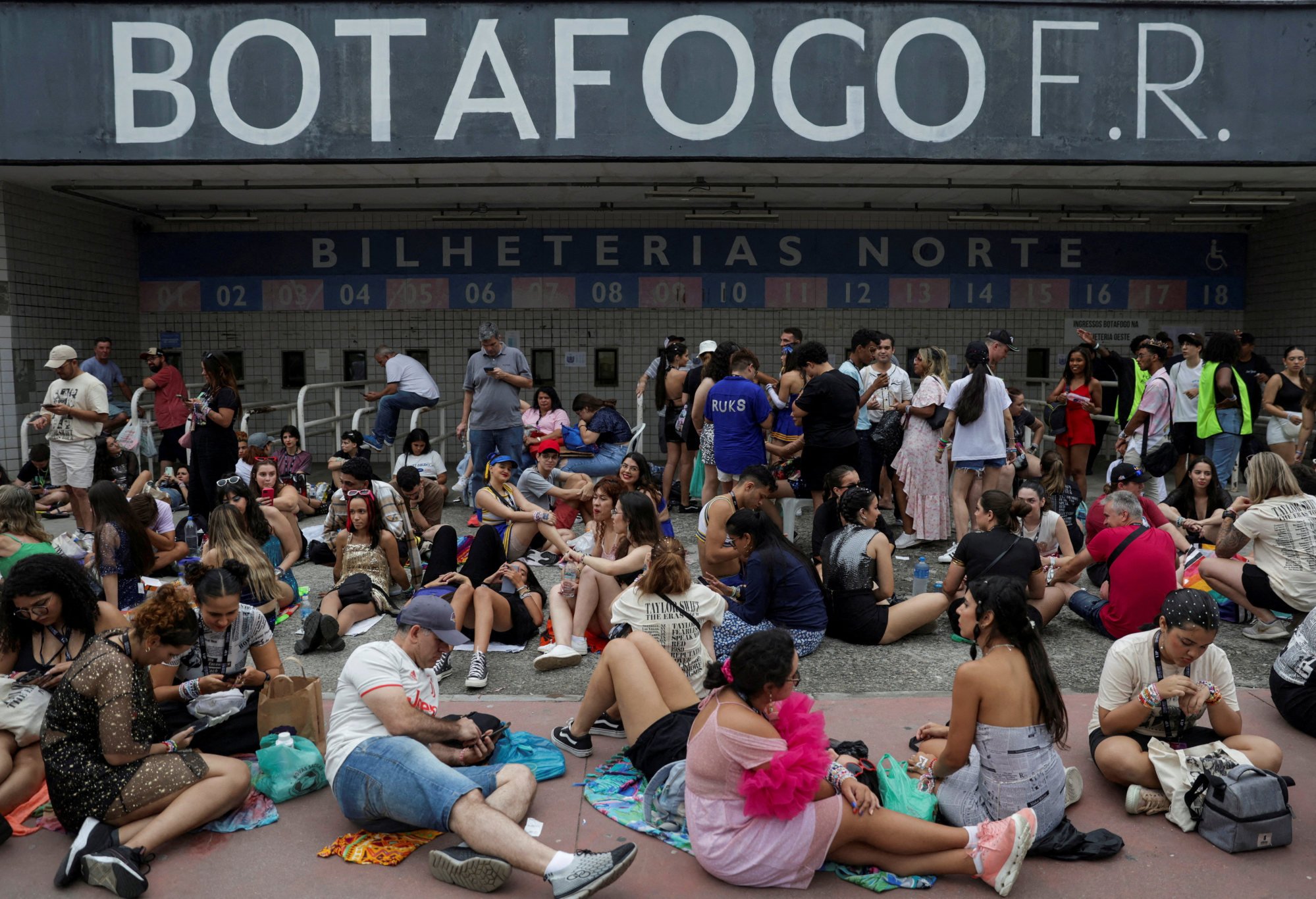
Taylor Swift needs to speak out on climate breakdown as fans drive concert tourism – so why isn’t she?
- Taylor Swift’s fans travel from far and wide to see the superstar’s shows, spending millions of dollars on flights, hotels, food and more
- Swift – and other performers like Blackpink and Beyoncé – have the power to wake up millions to the risks of climate change and need to be more vocal about it
Was Taylor Swift’s recent experience in Brazil a canary-in-the-coal-mine moment for the travel and tourism industry?
The American singer has become something of a mobile tourist attraction, with Swifties – as her fans are known – swooping in their thousands from places where she isn’t performing to places where she is.
And, “When Taylor Swift comes to town, Swifties go on a spending spree,” as The Wall Street Journal puts it. “It’s simple Taylornomics.”
Or Swiftonomics, as other publications dub the effect; she’s a “twin-nomics” phenomenon is Ms Swift.

Between March and August, during the 20-city United States leg of her ongoing Eras Tour, it’s estimated by The Washington Post that “Swift’s fans spent about US$93 million per show – yes, on tickets, but also on merchandise, travel, hotels, food and outfits. Add all that up, and by the end of the US tour, you’ve got a US$5.7 billion boost to the country’s economy.”
As Swift worked her way across America, The Wall Street Journal reported, “Her fans have been filling hotels, packing restaurants and crowding bars. Cities say the tour has helped them recover from the economic toll of the pandemic by bringing back tourists and their wallets.
Japan gets rude reminder of evils of overtourism as visitors return en masse
“[The singer is] filling football stadiums that hold more than 70,000 people, and Swift is often staying in town for several days, giving local businesses time to soak up the Swiftie money.
According to CNA, “In Chicago, Taylor Swift’s three-day stop in early June helped the city set a record for hotel occupancy, the tourism and conventions bureau said, with hotels raking in US$39 million in one weekend.”

In Asia, travel-related businesses are trembling with almost as much anticipation as fans ahead of the Swift shows scheduled in Tokyo and Singapore for February and March.
“According to Traveloka president Caesar Indra, flight bookings during the periods around Coldplay and Taylor Swift’s [Singapore] concerts next year have increased six-fold, indicating the immense popularity of concert-driven tourism,” reports CNA.
“There were 160 times more searches than usual. The spike was mostly driven by [fans from] Southeast Asia. The Philippines led the pack, followed by Indonesia, Thailand, Malaysia and Vietnam.”
There’s little doubt, then, that concert tourism is big business and a godsend for related businesses that may still be recovering following the pandemic. And the last thing anyone needs is for concerts to start being cancelled …
Have tickets for Taylor Swift, will travel far: the rise of music tourism
At her open-air arena show the previous evening – when the local heat index hit similar highs – a 23-year-old fan, Ana Clara Benevides, had died and Swift had her own problems on stage, an experience captured in a YouTube video with a variety of similar titles such as, “Taylor Swift Struggling To Breathe In Extreme Heat At Brazil Show Where Young Fan Died”.
It has also been reported that more than 1,000 people fainted from heat exhaustion that night in the Estádio Olímpico Nilton Santos, and others vomited.

Those weren’t the first heat-related issues to affect large shows in 2023, set to be the planet’s hottest year on record.
“The Swift concert disaster comes on the heels of a summer where fans experienced heat illness at a Beyoncé concert in Maryland and at an Ed Sheeran concert in Pittsburgh,” reports environmental website Grist.org.
“These incidents serve as a stark reminder of the dangers of extreme heat, which will only grow worse as heatwaves intensify as a result of climate change.”
Part of the problem may be that event management companies are not sufficiently prepared for the rising heat, but that in itself is a consequence of it still not being fully understood that the climate is changing. Quickly. And we need to do something about it. Quickly.

More to the point, Taylor Swift needs to do something about it … swiftly.
“She has the power to wake up millions of people to the risks of the climate crisis,” says Jeff Goodell, author of The Heat Will Kill You First (2023) and himself a Swiftie (having attended shows on her previous Red, 1989 and Reputation tours). “Why doesn’t she use it?
“I of course understand that for someone like [Taylor], the climate crisis is a political quagmire,” Goodell, a journalist who has been reporting on deadly heat for years, told Heated, a newsletter published on the Substack platform.
“She doesn’t have to trash-talk ExxonMobil. Just acknowledge in some very Taylor way that our world is heating up and we need to pay attention and get smart about the risks we face.
“She obviously has a deep emotional connection with her fans,” adds Goodell. “And when one of her fans dies at her concert because we’re cooking the planet with fossil fuels, doesn’t she have some responsibility to acknowledge that, or at least talk about it?”

The day Benevides died was not just sweltering in Brazil, it was also the first on which the global average temperature passed a milestone: 2 degrees Celsius above pre-industrialisation levels.
“The threshold was crossed just temporarily and does not mean that the world is at a permanent state of warming above 2 degrees, but it is a symptom of a planet getting steadily hotter and hotter, and moving towards a longer-term situation where climate crisis impacts will be difficult – in some cases impossible – to reverse,” explained CNN.
The implications for the planet are stark. And those for events in which tens of thousands of Swifties – or for that matter, Blinks or Beyhivers – dance around in sweaty proximity even more immediate.

Ideas about adapting to rising temperatures and, more importantly, reducing reliance on fossil fuels so they may be left in the ground abound, but in most cases, the will to implement them is still lacking.
If Taylor Swift, Blackpink, Beyoncé and other high-profile performers, their legions of adoring fans and the businesses and venues that benefit so greatly from visits by the mega-stars want the shows to go on, those stars not only have to take the dangers of extreme heat seriously, they also have to be vocal about the reason it’s getting so hot in the first place.

